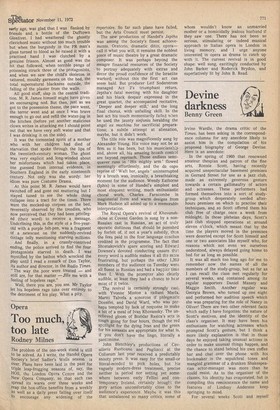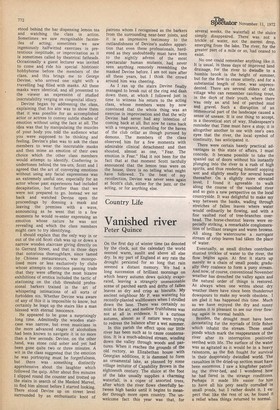Devine darkness
Benny Green
Irvine Wardle, the drama critic of the Times, has been asking in the correspondence columns for any anecdote likely to assist him in the compilation of his proposed biography of George Devine. Here is an anecdote: In the spring of 1960 that renowned amateur thespian and patron of the fine arts, Ronnie Scott, having recently acquired unspectacular basement premises in Gerrard Street for use as a jazz club, made an extremely generous gesture towards a certain gallimaufry of actors and • actresses. These performers had formed themselves into a sort of studygroup which desperately needed afterhours premises on w'hich to practise their techniques, and so Scott offered them his club free of charge , once a week from midnight. In those plebeian days, Scott's jazz club stopped operations at around eleven o'clock, which meant that by the time the players moved in the premises were deserted, except for Scott himself and one or two associates like myself who, for reasons which not even we ourselves understood, always delayed going home to bed for as long as possible.
It was all much too long ago for me to remember now the names of all the members of the study-group, but as far as I can recall the class met regularly for several weeks, and contained among its regular supporters Daniel Massey and Maggie Smith. Another regular was Georgia Brown, who turned up one night and performed her audition speech which she was preparing for the role of Nancy in Oliver! There are two other relevant facts which sadly I have forgotten: the nature of Scott's motives, and the identity of the class's organiser. It may have been his enthusiasm for watching actresses which prompted Scott's gesture, but I think a more likely explanation is that in those days he enjoyed taking unusual actions in order to make unusual things happen, and the chance to stand behind his own coffee bar and chat over the phone with his bookmaker in the sepulchral tones and mangled grammar of a drunken Shakespearian actor-manager was more than he could resist. As to the organiser of the classes, his identity has evaporated, but in compiling this reminiscence the name and features of Lindsay Anderson keep springing to mind.
For several weeks Scott and myself stood behind the bar dispensing lemon tea and watching the class in action. Sometimes we saw recognisable facsimiles of acting; sometimes we saw ingeniously halfwitted exercises • in pretentious ineptitude, or improvisation as it is sometimes called by theatrical fatheads. Occasionally a guest lecturer was invited to come and, ride his special histrionic hobbyhorse before the members of the class, and this brings me to George Devine, who arrived one night with a travelling bag filled with masks. All these masks were identical, and all presented to the viewer an expression of studied inscrutability verging on congenital idiocy.
Devine began by addressing the class, explaining that his aim was to show them that it was possible for an accomplished actor or actress to convey subtle shades of emotion without using the face at all. The idea was that by manipulating the muscles of your body you told the audience what you were supposed to be thinking and feeling. Devine's plan was to ask the class members to wear, the inscrutable masks and then mime an emotion of their own choice which the other class members would attempt to identify. Conferring in undertones behind the tea-urn, Scott and I agreed that the art of conveying emotions without using any facial expressions was an extremely useful one, especially for an actor whose past experiences had included decapitation, but further than that we were not prepared to go. Instead we sat back and watched Devine open the proceedings by donning a mask and leaving the premises with a wave, announcing as he went that in a few moments he would re-enter expressing an emotion whose nature he was not revealing and which the class members might care to try identifying.
I should explain that the only way in or out of the old Scott club was up or down a narrow wooden staircase giving directly on to Gerrard Street, and that in those days that notorious thoroughfare, since tamed by Chinese restaurateurs, was monopolised more or less exclusively by clubs whose attempts to convince passing trade that they were offering the most bizarre exhibitions of erotica included the tactic of stationing on the club threshold professional barkers trained in the art of whispering intimations of all sorts of forbidden sin. Whether Devine was aware of any of this it is impossible to know, but certainly he leapt up the stairs like a man blessed with eternal innocence.
He appeared to be gone a surprisingly long time. Admittedly the wooden staircase was narrow, but even musicians in the more advanced stages of alcoholism had been known to navigate it in no more than a few seconds. Devine, on the other hand, was stone cold sober and yet had been gone quite two or three minutes. A wit in the class suggested that the emotion he was portraying must be forgetfulness, but there was something distinctly apprehensive about the laughter which followed the quip. After about five minutes I slipped round the counter and trotted up the stairs in search of the Masked Marvel, to find him almost before I started looking. There stood Devine up on street level surrounded by an enthusiastic knot of patrons whom I recognised as the barkers from the surrounding near-beer joints, and it is an impressive testimony to the outlandishness of Devine's sudden apparition that even these professionals, hardened as they undoubtedly must have been to the nightly advent of the most spectacular human mutants, had, never seen anything remotely resembling the masked Devine before. I am not sure after all these years, but I think the crowd around him was cheering.
As I ran up the stairs Devine finally managed to break out of the ring and dash down them, at which I followed just in time to witness his return to the acting class, whose members were by now convinced that the whole thing was an exercise in improvisation and that the wily Devine had never had any intention of coming back at all. But now he came back with a vengeance, stumbling for the haven of the club cellar as though pursued by demons. The members of the class observed him for a few moments with admirable clinical detachment and then shouted, almost as one, "Fear. The emotion is Fear." Had it not been for the fact that at that moment Scott tactfully announced that the lemon teas were on the house, there is no telling what might have followed. To the best of my recollection, Devine was never seen again at Scott's club, either for the jazz, or the acting, or for anything else.



















































 Previous page
Previous page